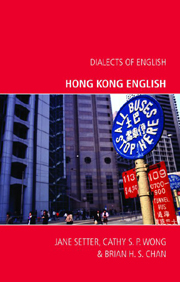6 - Hong Kong English: a sociolinguistic history
Published online by Cambridge University Press: 12 September 2012
Summary
The interest in Hong Kong English as a variety is a relatively recent phenomenon, and its status is very much under dispute (see section 6.4 below). Because of this, there has been little, if any, documentation of historical language change. Empirically, there have been few studies which describe the formal linguistic properties of Hong Kong English in great detail (in comparison with, say, Singapore English); this, coupled with the emergent status of the variety, means it is virtually impossible to compare two datasets collected at different times for varietal differences. In addition, work on Hong Kong English, other than that which looks at it as a learner language, did not really start in earnest until Luke and Richards' groundbreaking research in 1982. Change, as far as Hong Kong English is concerned, has almost exclusively focused on the social status of English, or the changing status of English with reference to spoken Cantonese and written Standard Chinese in the Hong Kong context.
This chapter surveys the sociolinguistic history of English in Hong Kong. The description leads on to a discussion concerning the emergence of Hong Kong English as a new variety. This is intended to contextualise the preceding chapters of the book, which primarily describe the formal linguistic aspects of Hong Kong English.
English in pre-colonial Hong Kong (pre-1842)
Probably the most comprehensive description of the early development of English in Hong Kong is to be found in Bolton (2003), specifically chapter 3, in which he surveys the situation between the mid-seventeenth and twentieth centuries.
- Type
- Chapter
- Information
- Hong Kong English , pp. 103 - 116Publisher: Edinburgh University PressPrint publication year: 2010



